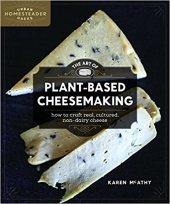Hi John,
So, before I address the 'reliable cheddar' issue ( a common common request, query from both my students and my customers), I thought I would preface my comment with a bit about what the objective and focus of the book is.
The book, is not designed to be a collection of recipes only, with the singular intent of a recipe. This book is a bit of an introduction to a longer more in depth follow up on which I am working, that is trying to establish some principles and concepts in plant-based cheesemaking, such as there is in 'traditional' or dairy cheesemaking.
The book focuses a bit on trying to identify where things are at now within plant-based cheesemaking, and what core or essential elements there may be, as vegan cheesemaking has very much evolved from the DIY level (much like the history of dairy cheesemaking).
As my particular interest is not in creating copies of dairy based cheeses (I've been allergic to dairy for a long time, and well before I became vegan), so, perhaps I am not quite a nostalgic about specific cheeses in the way that others might be. My goal is to try to make cheeses that are cheeses in their own right, just without animal products, and to focus on understanding culturing processes, microbes and what they do in creating flavor and texture.
The book does focus quite a bit on creating plant-based lactic acid forming cultures (rejuvelac, water kefir, using other plant-based starters), as a starting place for the home user to get familiar with culturing nut based mediums.
With respect to cheddar or other sharp cheeses, and only with respect to how I approach plant-based cheesemaking (others will have different approaches), I focus on the acidification of the curd, and then on the aging time, as well as pressing to eliminate moisture. Sharp flavor comes from duration of aging time and allowing the cultures to do their work of digesting proteins and carbohydrates, so the trick has been in finding a nut base that has a good mix of protein, carbohydrate and fat, so that the length of aging time does not produce rancid or other unpleasant results.
As I personally do not use agar or carageenan in my cheeses (I do write about them a bit in the book, and how they are used in some vegan cheesemaking), I have focused much more on flavor and overall texture than meltability .... plant-based bases not having the same protein structure as dairy, and do not coagulate the same way during the curd forming process.
Anway, I feel that I am rambling quite a bit, but, in short (hahahaa)... I am hoping the book will give folks some tips for experimenting themselves and though there is a cheddar process in the book, as with many of these things, it will come down to time and patience.
I am hoping in my second book, to provide deeper information ( as I am currently working to have more of the processes I use lab tested for reliability etc).
If you have been making plant-based cheeses at home, I would love to hear about your experiments.







 the book should offer some core recipes that can work well for your own at home experimentation. I do offer some easy aging practices towards the end of the book to help folks age their cheeses.
the book should offer some core recipes that can work well for your own at home experimentation. I do offer some easy aging practices towards the end of the book to help folks age their cheeses.



